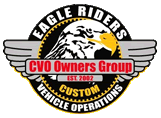I have practiced panic stops in an empty parking lot 3 times in the past 6 months...at the same time, I practiced swerving manuvers, making slow speed turns.
I guess the point of this discussion about brakes/calipers is that we all know locking up the brakes is the MOST inefficient way to stop, so any improvement in feel and friction between the caliper, pad, and rotor will help a person avoid lock-up, all other things being equal. So, although I was probably on the verge of locking up the front, if the brakes are more efficient, they will stop the bike quicker with the same amount of pressure, without locking up.
In the PDF file above, running 97mph, and applying the maxium braking pressure, the mass stopped nearly 100 feet sooner with aftermarket calipers than with stock. That is a LOT of distance not covered in identical situations. If you add into that whole equation the fact that with the stock HD front forks, they will pretty much be bottomed out, shifting even more of the weight to the front tire, the situation becomes even more unmanageable. The rear tire/brake then becomes even less effective, and will be more likely to lock up (which is what happened to me in real life, and in the parking lot).
Chief, you are 100% right in saying that we all need to get out more and practice doing this kind of stuff...the more we do so, the more automatic it becomes. I am convinced that if I had not practiced the very thing I did to avoid eating up the back end of that ladies car, my bike wouldn't look nearly so good right now, not to mention me and Suzanne. It's Suzanne I'm more concerned about than myself, so whatever I can do to make my bike stop better and handle more effectively with the skills I have (not that I am skilled), is time and money well spent. It is my opinion, and only my opinion, that some owners spend a lot of time and money getting their bike to go faster in a straight line, and not enough making it stop and go around curves better, which is not simply a matter of riding skill, but characteristics of the bike as well.
It could and should be argued that I should not have been close enough to the the car in front of me for it to be an issue, but despite our best intentions, chit happens. I kicked my own a$$ for several minutes after that incident, but it's the unexpected that always bites us, and by definition we cannot prepare ourselves adequately for those situations. But, one thing I can do is make the bike able to do the best it can do with appropriate input from me. These certainly are not race bikes, but who here is not guilty of pushing the bike to the limits of it's capability from time to time? Making it a bit more capable just gives me a little comfort in the back of my mind, especially when I learn it's weaknesses.
How's that for a rationalization to spend a bunch of money on chrome calipers, new rotors, and new front fork cartridges? 

You're ahead of me on that one. I've always been a big proponent of practice, but have been real lax about it for awhile. I really need to get back to it.
We won't even open the box of how we SHOULD ride, and how we DO ride. No no no. That is not a good box.
The underlying theme to my post, if ther is one, is we can throw all kinds of stuff at our bikes to make them preform perfect, but usually the weakest link is the rider. I admit I should spend more time perfecting the rider than I do. This discussion has made me think about that... and that is a good thing.
Chief
 Author
Topic: Article on Brakes (Read 20719 times)
Author
Topic: Article on Brakes (Read 20719 times)

